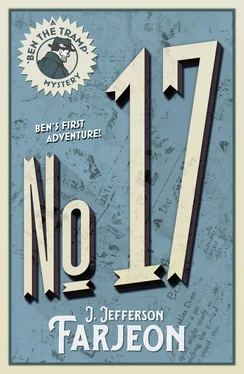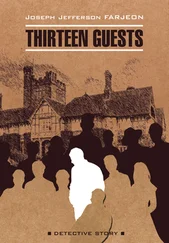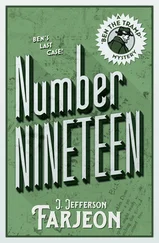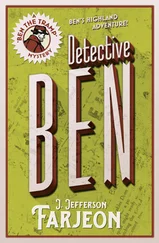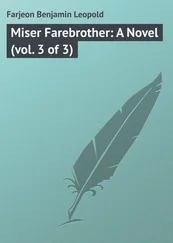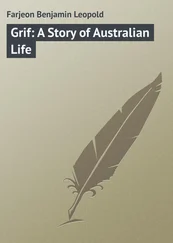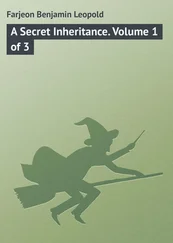A blessed silence greeted him.
A faint noise in the room he had just left, however, disturbed the blessedness. His mind instantly flashed to the locked door, and he visualised it slowly opening, and heaven knows what coming out! Had he stopped to think, he might have fled downstairs, but the two things he loved best in all the world were in that room—the pork and beans and the candle—and they were worth some risk in this house of risks. He returned to the room rapidly, and disturbed a little mouse enjoying a crumb of cheese.
‘’Ere—wotcher mean, pretendin’ ter be a ghost?’ demanded Ben indignantly.
The mouse, like Ben, became divided against itself. This great, hulking thing was a terror; but the cheese was wonderfully succulent. Two reproachful eyes peered up at Ben from the boards.
‘Oh, go hon—don’t mind me!’ jeered Ben. ‘But, look ’ere, Charlie, you was ’ere while I was gorn—didjer see that there door a-movin’ jest nah?’
He jerked his thumb towards the locked door. The mouse, still eyeing him solemnly, refused to commit itself.
‘Boo!’ cried Ben.
A frenzied flash, and the mouse was gone. Ben felt no animosity against the mouse, but it gave him a sort of satisfactory feeling to frighten something. Moreover, it suggested a pleasant theory. If he could scare a mouse, without any desire to harm the mouse, why could not something scare Ben, without any desire to harm Ben?
This thought was rudely disturbed by a new emotion. The tin on the fire slipped, and began to pour itself out.
‘Oi!’ gasped Ben. ‘’Arf a mo’!’
He rushed across, and rescued the tin, nearly scalding his hand in the process. Luckily, not more than a penn’orth had flowed away.
Many strange things were destined to happen in this room within the next twenty-four hours, and while Ben is busy with his pork and beans, it may be as well for us to examine the room a little more closely. Its walls and ceiling were in a most dilapidated condition. The paper was yellow with age, and in some places had peeled right off. In others, it was peeling. Here and there, bits of the ceiling had come down, and the vibration caused by the trains that ran under the house suggested one cause of this. The trains could still be heard from the attic, though the sound was naturally fainter and more muffled than it had been down in the basement.
Facing the door by which Ben had entered the room, and with our back to the opposite blank wall, we note two or three packing-cases that lined the left-hand wall, ceasing at the locked door which Ben had not been able to open. This locked door was near the corner of the room, and round the corner came the door to the passage—a small passage containing, in addition to the attic door, nothing more notable than the head of the descending staircase, and above, in the low roof, the skylight. Inside the room again, to the right of the passage door as one turned and faced it, were more packing-cases. By climbing upon them one could reach a small, high window, which Ben had noted with satisfaction was closed. Then, round the corner to the next right-hand wall, came a bare space, the door leading to the inner chamber, the fireplace, and the single, battered chair.
Such was the configuration and furnishing of this room of destiny, where an out-of-work seaman sat dispatching pork and beans.
His simple meal over, Ben smiled contentedly, and prepared once more to make himself comfortable for the night—or, for the rest of the night. Towards this end, he poked his head into the inner chamber, assuring himself again that it was empty, and made one last effort to get the locked door on the opposite wall open. Failure, of course, greeted this effort. Finally, he stepped out on to the little landing …
‘Ah, not this time, lovey!’ he chuckled, as a soft sound came to him—not from below. ‘I ain’t feared o’ mice no more!’
The soft sound continued, and he tiptoed back to the room to give his little friend another surprise. But no small eyes greeted him this time. Nor was there any flashing scurry. His grin froze on his face, as he realised that, this time, a mouse was not responsible.
Ben had not gained a reputation for speed in the Merchant Service, but there were times when he acted quickly. This new soft sound was worse than anything he had heard—he could not define it, or place it. But it was up here—somewhere—which meant that Ben must get down there, anywhere, He scampered down the stairs like a frightened rat.
But, even in that mad scamper, he stopped dead at the head of the stairs that led down to the ground floor. Someone was below, with footsteps as hurrying as Ben’s.
And the footsteps were coming up.
The fog did not lift through the night. London awoke to another day of yellowness, the optimists rubbing their eyes, the pessimists croaking. More blind groping, more wheezing and coughing, and more traffic strangulation. Only the companies that profited by artificial illumination, and the children who profited by the absence of their governess, smiled as they greeted the opaque morning. The rest of the world saw small joy in the adventure.
All day long, the ineffective lamp-post outside the house of strange happenings flickered intermittently upon the number, ‘17,’ Often, the number could not be read at all, despite the nearness of the light, but sometimes the fog thinned a little, and then the number grew out and vaguely beckoned. But few of the few people who passed along that unfrequented road troubled to notice it. Why should they? And, certainly, no one thought of answering its grim invitation.
A fog is bad enough. Who wants an empty house thrown in?
Between three and four in the afternoon, however, a passer-by might have paused. The house was dark and silent, saving for a very faint flicker in the top room. This flicker suddenly disappeared, to reappear a few seconds afterwards behind a window on the lower floor. Then, again, it vanished, and then again it appeared on the ground floor. After that, it vanished completely.
And then a passer-by did indeed come along, and appear to respond to the house’s grim invitation. He was a man with a crooked shoulder, and he paused outside the house and looked at it. As though to ensure his interest, the fog thinned momentarily, allowing the street lamp to shine more clearly on the number ‘17,’ and even revealing, for an instant, the front door.
The front door was ajar.
The man with the crooked shoulder looked at the door; then, turning his head, he glanced up and down the street. His eyes, of course, met nothing, since another man could have been standing five feet off without being seen. When he turned his head back to the front door, the fog had thickened again and he could no longer see the door. But he knew the door was ajar, and the knowledge fascinated him.
He stood there, perhaps, twenty seconds. Then, suddenly, he slipped into the house, and the door closed behind him.
And now it really seemed as though that silent street of ghosts and whisperings began to wake up and enter the arena of more normal, commonplace matters. A new figure groped its way along the pavement, a figure, this time unsinister and fashionable.
‘Hey! W-where are you?’ it stammered. ‘Where the d-dickens—’
It turned, and looked back—or tried to look back—along the way it had come. A well-dressed young man, with a good-natured, pleasant face, was revealed by the lamp-light. The lamp-post itself was revealed to the young man only when he backed into it.
‘Hallo! So there you are!’ he cried, in a voice of relief. ‘Where the devil did you g-get to, old chap? I—’
He stopped abruptly, as he turned to the lamp-post. Good-humoured annoyance shone on his features.
Читать дальше
